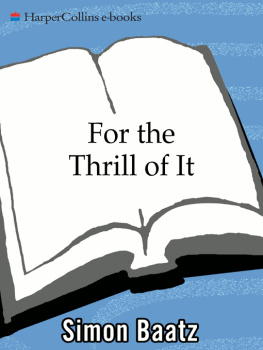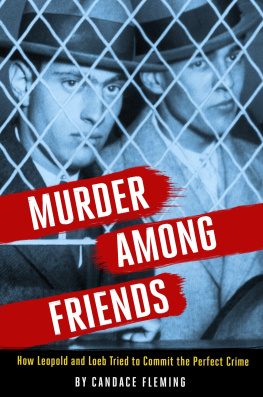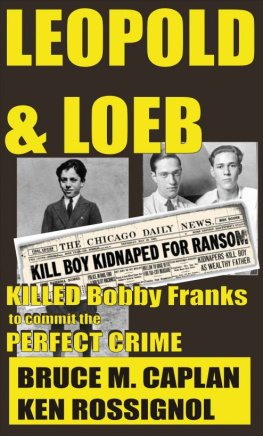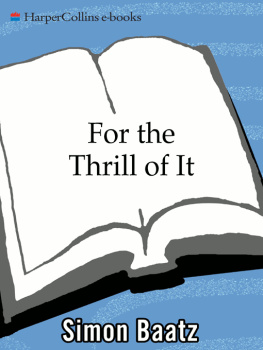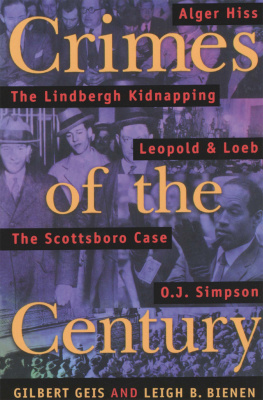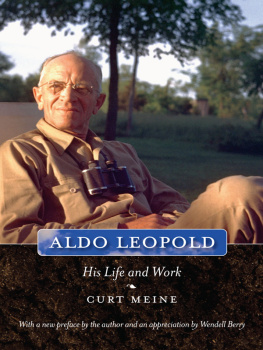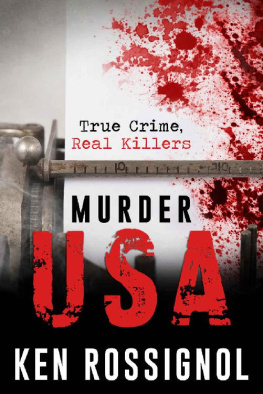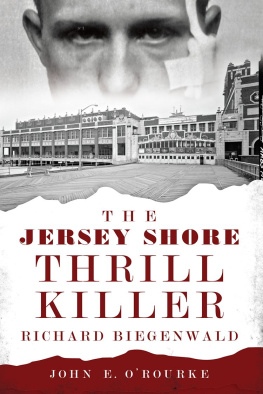For the Thrill of It
Leopold, Loeb, and the Murder That Shocked Chicago
Simon Baatz

The problem I thus pose iswhat type of man shall be bred, shall be willed, for being higher in value. This higher type has appeared oftenbut as a fortunate accident, as an exception, never as something willed. Success in individual cases is constantly encountered in the most widely different places and cultures: here we really do find a higher type that is, in relation to mankind as a whole, a kind of superman. Such fortunate accidents of great success have always been possible and will perhaps always be possible.
Friedrich Nietzsche, The Antichrist , Sections 3, 4
Im reminded of a little article you wrote, On Crime, or something like that, I forget the exact title. I had the pleasure of reading it a couple of months ago in the Periodical .
My article? In the Periodical Review ? Raskolnikov asked in surprise. Raskolnikov really hadnt known anything about it.
Thats right. And you maintain that the act of carrying out a crime is always accompanied by illness. Very, very original, but personally that wasnt the part of your article that really interested me. There was a certain idea slipped in at the end, unfortunately you only hint at it, and unclearly. In short, it contains, if you recall, a certain reference to the notion that there may be certain kinds of people in the world who canI mean not that they are able, but that they are endowed with the right to commit all sorts of crimes and excesses, and the law, as it were, was not written for them.
The heart of the matter is thatall people are divisible into ordinary and extraordinary. The ordinary must live obediently and have no right to transgress the lawbecause, you see, theyre ordinary. The extraordinary, on the other hand, have the right to commit all kinds of crimes and to transgress the law in all kinds of ways, for the simple reason that they are extraordinary. That would seem to have been your argument, if I am not mistaken.
Raskolnikov smiled again. He understood at once what was going on and the direction in which they were trying to push him. He remembered the article, and decided to accept their challenge.
Thats not quite the way I put it, he began simply and modestly. Still, I must admit, youve got the gist of it. Even completely right, if you wish.
Fyodor Dostoyevsky, Crime and Punishment , Part 3, Section 5
This is a true story. The events described here occurred in Chicago in the summer of 1924. The conversation and dialogue in this book, indicated by quotation marks, are taken verbatim from the transcript of the courtroom proceedings, from the records of the office of the states attorney of Cook County, or from contemporary newspaper accounts. The University of Chicago and the University of Michigan generously provided me with the academic transcripts of Nathan Leopold and Richard Loeb, respectively. I wish also to thank the archivists at Northwestern University; the Wisconsin Historical Society; Columbia University; the University of California, Berkeley; Stanford University; and the National Archives in Washington, D.C., for permitting me to quote from materials in their possession.
W EDNESDAY, 21 M AY 1924T HURSDAY, 29 M AY 1924
This cruel and vicious murderthis gruesome crimethis atrocious murderthe most cruel, cowardly, dastardly murder ever committed in the annals of American jurisprudence.
Robert Crowe, states attorney of
Cook County, 23 July 1924
Everybody knows that this was a most unfortunate homicide. That it is the cruelest, the worst, the most atrocious ever committed in the United States is pure imagination without a vestige of truth. A death in any situation is horrible, but when it comes to the question of murder it is doubly horrible. But there are degreesof atrocity, and as I say, instead of this being one of the worstit is perhaps one of the least painful.
Clarence Darrow,
defense attorney, 23 July 1924
F LORA F RANKS GLANCED AT THE CLOCK. Already past six oclock and still no sign of Bobby! The cook had prepared dinner and the maids were waiting patiently for the family to move to the dining room. Normally she could rely on her eldest son, Jack, sixteen years old, to keep an eye on his younger brother, but Jack lay upstairs in bed, ill with chicken pox; he had not been to school all week. Her daughter, Josephine, seventeen years old, tried to calm Floras fearsBobby always played baseball after school; perhaps he had gone to a friends home for supper after the game.
Jacob Franks agreed with his daughter. Admittedly it was not like Bobby to be late for dinner; but nothing serious had happened to the boy. It was only three blocks from the Harvard School to their house and Bobby was now fourteen years old, old enough to know not to talk to strangers. The boy had probably fallen in with a classmate after the game and had forgotten the time. Still, he was annoyed that his son should be so thoughtless and forgetful, annoyed with Bobby for causing his mother to worry.

Bobby Franks was a pupil at the Harvard School for Boys. This photograph appeared as the frontispiece to a collection of poems published in his memory by his brother Jack.
Jacob Franks was proud of his four children: Josephine had been accepted at Wellesley College for the fall, and Jack, a junior at the Harvard School, was planning to attend Dartmouth College. Jacob Jr. was the youngest child, still a student in grade school, but already showing signs of academic prom
F OR F LORA AND J ACOB F RANKS, their four children were the capstone of their lives. As a young boy, Jacob Franks had lost his own father. His mother had run a clothing store and then a pawnshop in Chicago, and in 1884 Jacob had set up in business for himself, opening a pawnshop on Clark Street south of Madison Street. It was a good location and an auspicious timegambling was then unregulated in the city and there were at least a dozen gaming houses within a block of Jacob Frankss pawnshop.
Jacob soon built up a loyal clientelethe gamblers could rely on Jacob to lend them as much as ninety percent of the value of the diamonds, watches, and rings that they pawnedand once their luck turned, they could easily redeem their property. Michael (Hinky Dink) Kenna, Democratic alderman of the First Ward and one of the most powerful politicians in Chicago, remembered Jacob Franks as an honest businessman who earned the loyalty of his customers: He ran the business strictly on the square and he had the respect of every man who ever made a loan. He knew who he was dealing with, and for that reason would take a chance.
Jacob Franks never ran for political office, yet he was well connectedFranks, according to one politician, has for years been a big factor in the Democratic partyand he used his connections to make his fortune. An opportunity to buy stock in the Ogden Gas Company was a lucky break for Franks and his business partner, Patrick Ryan; the two entrepreneurs sold the stock to the Peoples Gas Light and Coke Company at an enormous profit estimated by one friend to be as much as $1 million. Franks bought land in the downtown district and watched its value soar when the city moved the grog shops, gambling dens, and brothels farther south, to the Levee between 18th and 22nd streets. By 1924, Jacob Franks was wealthy beyond his wildest dreams; he was worth, at a conservative estimate, more than $4 million.

